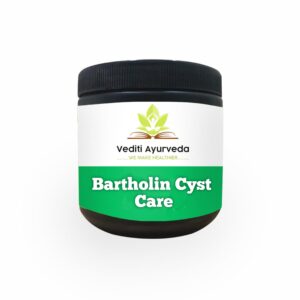Best Diet Plan for Bartholin Cyst
A Bartholin cyst is a common condition where one of the Bartholin glands, located near the vaginal opening, becomes blocked and forms a fluid-filled lump. Although treatment often involves medical procedures such as drainage or surgery, adopting a healthy diet can be an effective way to support healing, reduce inflammation, and prevent recurrence. An optimal diet plan can help restore balance to your body’s internal systems, promote detoxification, and support your immune function. This article will explore the best diet for managing and preventing Bartholin cysts.
Understanding the Role of Diet in Bartholin Cysts
In Ayurvedic medicine, health is viewed through the lens of doshas: Vata, Pitta, and Kapha. These energies, when out of balance, can lead to various health conditions, including cysts. A well-balanced diet helps restore this harmony by nourishing the body and addressing internal imbalances. Pitta dosha, associated with heat and inflammation, is often linked to the development of Bartholin cysts. Kapha dosha, on the other hand, governs fluid retention and can contribute to the buildup of cysts. Therefore, following a diet plan that promotes cooling, detoxifying, and anti-inflammatory foods is essential for healing.
Key Dietary Principles for Bartholin Cysts
To support the body in healing from a Bartholin cyst, the following dietary guidelines should be followed:
1. Anti-Inflammatory Foods
Since Bartholin cysts are often associated with inflammation and infection, including anti-inflammatory foods in your diet can help reduce swelling and promote healing.
Recommended Anti-Inflammatory Foods:
- Turmeric: Known for its potent anti-inflammatory properties, turmeric can be added to curries, soups, or teas. It is best absorbed when combined with black pepper and a source of fat, like coconut oil.
- Ginger: This root has anti-inflammatory and antimicrobial effects. Ginger tea or incorporating fresh ginger into meals can be highly beneficial.
- Berries: Blueberries, strawberries, and raspberries are rich in antioxidants and help combat inflammation in the body.
- Green leafy vegetables: Spinach, kale, and collard greens contain essential nutrients and help reduce inflammation.
- Olive oil: Use extra virgin olive oil as your primary cooking oil for its anti-inflammatory properties.
2. Hormonal Balance Foods
Hormonal imbalance is another factor that can contribute to Bartholin cyst formation. Foods that support hormonal health and detoxification are essential for maintaining a balanced endocrine system and preventing cysts from recurring.
Recommended Hormonal Balance Foods:
- Flaxseeds: Rich in lignans, flaxseeds help balance estrogen levels and support hormonal health.
- Chia seeds: Like flaxseeds, chia seeds are a great source of omega-3 fatty acids and fiber, which help support hormonal health.
- Cruciferous vegetables: Broccoli, cauliflower, Brussels sprouts, and cabbage are excellent for detoxifying the body and balancing estrogen levels.
- Avocados: These nutrient-dense fruits contain healthy fats that support hormone production and overall reproductive health.
- Seaweed: Seaweed is rich in iodine and other minerals that can help regulate thyroid function, which in turn supports hormonal balance.
3. Detoxifying Foods
A clogged Bartholin gland often results from toxins in the body. Detoxifying foods help clear these toxins, allowing the body to heal more effectively.
Recommended Detoxifying Foods:
- Lemon: The high vitamin C content in lemons helps flush toxins from the liver, improve digestion, and support overall detoxification.
- Beets: Beets are known for their liver-detoxifying properties, which can help the body eliminate waste and toxins.
- Cucumber: Cucumber helps hydrate the body, promote detoxification, and maintain skin health.
- Garlic: A potent detoxifier, garlic has antimicrobial properties and can help eliminate harmful bacteria that might contribute to cyst formation.
- Herbal teas: Green tea, dandelion root tea, and milk thistle tea support the liver’s detoxification process.
4. Foods That Reduce Fluid Retention
As Bartholin cysts are often caused by fluid buildup, foods that reduce fluid retention can help prevent and manage cyst formation.
Recommended Foods to Reduce Fluid Retention:
- Watermelon: Watermelon is highly hydrating and promotes the elimination of excess fluids.
- Coconut water: Packed with electrolytes, coconut water helps reduce fluid retention and maintain proper hydration.
- Celery: Known for its diuretic properties, celery helps reduce fluid retention and flush out excess sodium from the body.
- Parsley: Parsley can act as a natural diuretic and help balance fluid levels in the body.
- Cranberries: Cranberries are effective in preventing urinary tract infections and help flush toxins from the kidneys.
5. Probiotic-Rich Foods
Probiotics support gut health and help maintain a balanced microbial environment. A healthy gut microbiome contributes to a stronger immune system, which is crucial for preventing infections and cyst formation.
Recommended Probiotic-Rich Foods:
- Yogurt: Choose plain, unsweetened yogurt with live and active cultures for beneficial bacteria.
- Kefir: Kefir is a fermented milk drink that provides a high dose of probiotics, which support gut and immune health.
- Kimchi and Sauerkraut: These fermented vegetables provide beneficial bacteria that support digestive health.
- Miso: Miso, made from fermented soybeans, is rich in probiotics and can be added to soups and stews.
6. Avoidance of Inflammatory and Hormonal Disrupting Foods
Certain foods can exacerbate inflammation, hormonal imbalances, and fluid retention. To promote healing, these should be minimized or avoided.
Foods to Avoid:
- Refined sugars: Excess sugar increases inflammation in the body and can disrupt hormonal balance.
- Dairy products: Dairy may increase mucus production and inflammation, especially for individuals sensitive to it.
- Processed foods: These often contain preservatives, additives, and unhealthy fats that can trigger inflammation and disrupt hormonal balance.
- Caffeine: Excess caffeine can interfere with hormone regulation and lead to dehydration.
- Alcohol: Alcohol can contribute to dehydration and imbalance liver function, slowing detoxification.
Sample Diet Plan for Bartholin Cyst
Morning:
- Start your day with a warm glass of lemon water to promote detoxification.
- Have a smoothie made with spinach, flaxseeds, berries, and unsweetened almond milk.
- Optionally, enjoy a cup of green tea for added antioxidants.
Lunch:
- A salad with leafy greens, avocado, cucumber, beets, and a drizzle of olive oil and lemon juice.
- A side of grilled salmon or tofu for protein and healthy fats.
Snack:
- Celery sticks with a dip made from hummus or guacamole.
- A handful of chia seeds sprinkled over fruit or yogurt.
Dinner:
- A vegetable stir-fry with broccoli, cauliflower, and mushrooms, served with quinoa or brown rice.
- A small portion of chicken, lentils, or chickpeas for protein.
Before Bed:
- A warm cup of herbal tea such as dandelion root or ginger tea to promote digestion and relaxation.
Conclusion
A well-balanced diet plays an essential role in managing and preventing Bartholin cysts. By incorporating anti-inflammatory, detoxifying, and hormonal balance foods into your daily routine, you can help support the body’s natural healing process and reduce the likelihood of future cyst formation. Additionally, avoiding inflammatory and hormonal-disrupting foods can further enhance your overall health.








